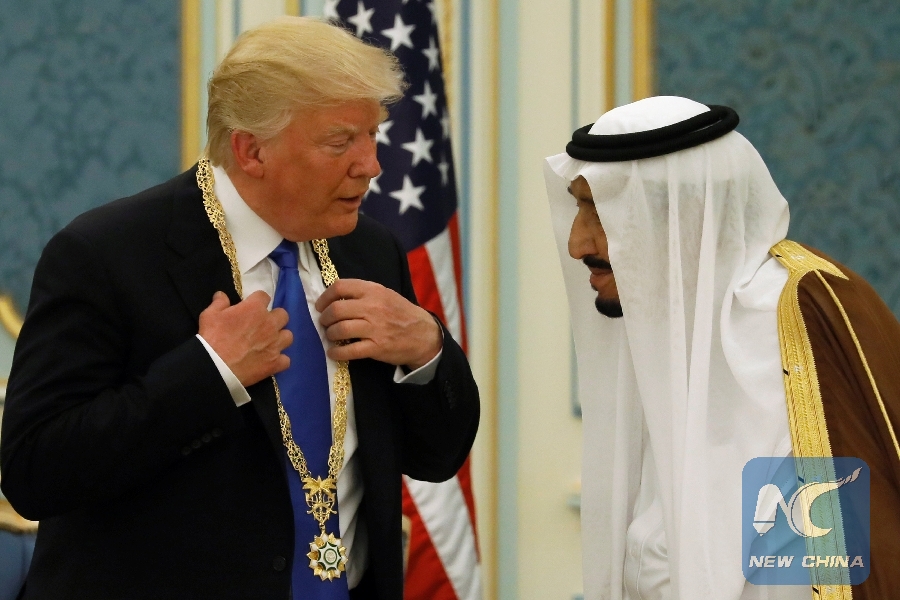
File Photo: Saudi Arabia's King Salman bin Abdulaziz Al Saud (R) presents U.S. President Donald Trump with the Collar of Abdulaziz Al Saud Medal at the Royal Court in Riyadh, Saudi Arabia May 20, 2017. (Xinhua/REUTERS)
WASHINGTON, Oct. 29 (Xinhua) -- As the ongoing investigation of the Saudi journalist's death continued to perplex the world, U.S. experts say the incident is unlikely to lead to a fundamental change for the U.S.-Saudi ties.
Saudi journalist Jamal Khashoggi, a columnist for Washington Post, has not been seen since he entered the Saudi consulate in Istanbul on Oct. 2. Riyadh admitted that the 59-year-old was killed inside the consulate and 18 people were arrested over their alleged connections to the killing afterward.
In its latest public statement, the White House said on Monday that the Trump administration "is weighing different options" in response to the case and will make an announcement later.
Since the disclosure of Khashoggi's murder, Washington has criticized the Saudi authorities for its handling of the case while President Donald Trump himself showed certain restraint on vocal attack against Riyadh.
Trump and his senior advisor Jared Kushner are key strong supporters of the Saudis while others may hold a different view, Darrell West, a Brookings Institution Senior Fellow, told Xinhua.
U.S. Congress soured on alliance with Riyadh following the case, calling for sanctions and a ban of arms sales to the kingdom.
"Obviously we're going through a period of tension and uncertainty and strain," said David Pollock, a scholar at the Washington Institute for Near East Policy.
For Ford O'Connell , a Republican strategist and TV personality, Washington has to "make a stand here."
"The rest of the world is watching. And if he (Trump) doesn't take some sort of proportional action, it's going to send a message to the rest of the Arab world," O'Connell told Xinhua.
Pollock observed that there were already some "symbols" demonstrating America's disapproval of what happened to Khashoggi, including some individual sanctions and cancellation of some official meetings.
The U.S. State Department announced last week that it was revoking visas of Saudi officials suspected of involvement in the death of Khashoggi, a first concrete step of punishment taken by the U.S. government. But the move has been criticized as quite symbolic and bearing little practical consequence.
"On the whole, I think the administration seems pretty set on maintaining the basic elements of this relationship," Pollock toldXinhua.
Wayne White, a former U.S. State Department official, shared a similar view. "President Trump likely still hopes to get past the Khashoggi affair without serious damage to the U.S.-Saudi relationship," he said.
Experts believe that the vital role Riyadh plays in Washington's comprehensive strategy of containing Iran would make the Trump administration reluctant to distance itself from the ally.
"Any U.S. plans to confront Iran forcefully depend heavily on Saudi Arabia for basing, refueling, overflight rights, among others," noted White, who once served as deputy director of the Middle East Intelligence Office of the State Department.
"The change in atmosphere (regarding U.S.-Saudi ties) is going to add another layer of complexity to the U.S. government's effort to contain and isolate and counter Iran, but it's not going to change the basic approach," Pollack said.
"As a result of the murder and cover-up, it will be harder to use Saudi Arabia to pursue American interests in the Middle East," noted West.
(Matthew Rusling from Washington also contributed to the story.)

